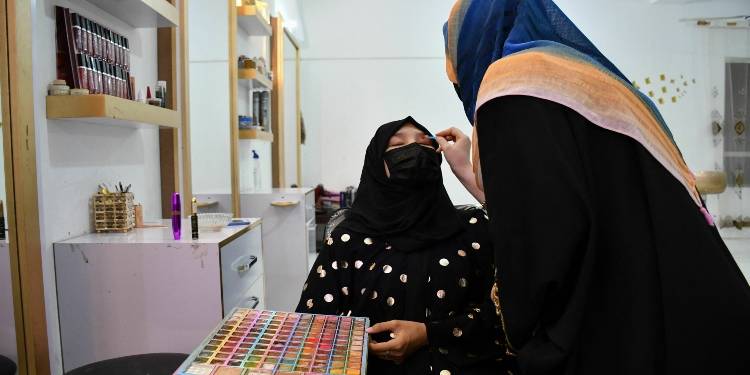
Since taking control in August 2021, the Taliban government has issued orders for the closure of thousands of salons managed by women. They have also forbidden girls and women from attending high schools and colleges, as well as parks, amusement parks, and gyms. They have also issued orders for the closure of thousands of salons managed by women.
However, a decision made last month forbade one of the few options left for women to socialize outside the home and required the closure of thousands of salons managed by women. These businesses are sometimes the sole source of income for homeowners.
"We used to come here to take our time discussing our future. Bahara, a client at a salon in Kabul, lamented the loss of even this right.
"Women are not allowed to enter entertainment places, so what can we do? Where can we go to enjoy ourselves? Where can we gather to meet each other?"
In Kabul last week, security personnel fired into the air and used fire hoses to scatter hundreds of women resisting the order.
Salons were given until Tuesday to close by the Ministry for the Promotion of Virtue and Prevention of Vice in late June, with the explanation that this would give them time to use up stock.
It said that it issued the injunction because some salon procedures violated Islamic law and that lavish sums spent on makeovers put struggling families at risk.
The ministry said that eyelash extensions and hair weaving were prohibited and that excessive makeup impeded women from performing sufficient ablutions for prayer.
In the 20 years that American-led forces controlled Afghanistan, beauty salons sprang up all over Kabul and other cities.
They gave women essential economic possibilities and served as a secure haven for gathering and socializing away from men.
When the Taliban gained control, many female government employees either lost their jobs or started receiving pay to stay at home.
The Afghanistan Women's Chamber of Commerce and Industry estimates that an additional 60,000 women would lose their jobs at around 12,000 salons as a result of the ban on beauty parlors.
Richard Bennett, the special rapporteur for Afghanistan, stated in a report submitted to the UN Human Rights Council last month that the situation facing women and girls in that nation "was among the worst in the world."
Bennett stated that there is "grave, systemic, and institutionalized discrimination against women and girls at the core of Taliban ideology and rule, raising concerns that they may be accountable for gender apartheid."
However, a decision made last month forbade one of the few options left for women to socialize outside the home and required the closure of thousands of salons managed by women. These businesses are sometimes the sole source of income for homeowners.
"We used to come here to take our time discussing our future. Bahara, a client at a salon in Kabul, lamented the loss of even this right.
"Women are not allowed to enter entertainment places, so what can we do? Where can we go to enjoy ourselves? Where can we gather to meet each other?"
In Kabul last week, security personnel fired into the air and used fire hoses to scatter hundreds of women resisting the order.
Salons were given until Tuesday to close by the Ministry for the Promotion of Virtue and Prevention of Vice in late June, with the explanation that this would give them time to use up stock.
It said that it issued the injunction because some salon procedures violated Islamic law and that lavish sums spent on makeovers put struggling families at risk.
The ministry said that eyelash extensions and hair weaving were prohibited and that excessive makeup impeded women from performing sufficient ablutions for prayer.
In the 20 years that American-led forces controlled Afghanistan, beauty salons sprang up all over Kabul and other cities.
They gave women essential economic possibilities and served as a secure haven for gathering and socializing away from men.
When the Taliban gained control, many female government employees either lost their jobs or started receiving pay to stay at home.
The Afghanistan Women's Chamber of Commerce and Industry estimates that an additional 60,000 women would lose their jobs at around 12,000 salons as a result of the ban on beauty parlors.
Richard Bennett, the special rapporteur for Afghanistan, stated in a report submitted to the UN Human Rights Council last month that the situation facing women and girls in that nation "was among the worst in the world."
Bennett stated that there is "grave, systemic, and institutionalized discrimination against women and girls at the core of Taliban ideology and rule, raising concerns that they may be accountable for gender apartheid."

